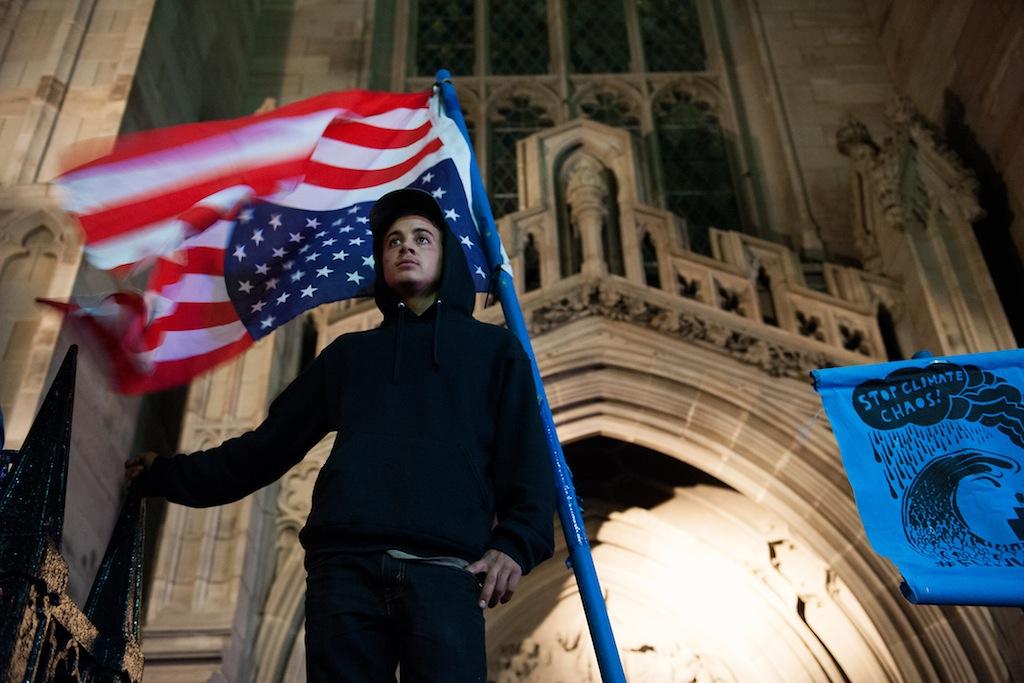At the People’s Climate March, youth took the lead
An onlooker watches as police arrest demonstrators after they refused to move from Broadway following the Flood Wall Street protest on September 22, 2014 in New York City. The Flood Wall Street protest came on the heels of the climate change march on September 21 that attracted over 300,000 protestors.
NEW YORK — The day after the People’s Climate March, and I’m awash with emotion. I’m exhausted, and exhilarated, from having gotten up before dawn to take a four-hour bus ride from Providence, Rhode Island to march for six hours through the streets of New York City with my 11-year-old daughter.
The streets were mobbed with 300,000 or 400,000 serious but upbeat people, making it by far the largest climate change protest in history.
The crowd was diverse, with elderly church people and minority groups on the “front lines” where climate impacts are already being felt at the front of the two- mile parade. There were peace groups and anti-nuclear groups and gobs of vegans. The whole crowd would join in cheers like:
“What do we want?”
“Climate justice!”
“When do we want it? "
“Now!”
I honestly was not sure I would ever see this day.
As someone who has worked his whole life on the issue of climate change, I feel emotional just being surrounded by a multitude with so much energy and determination to address this issue that threatens, literally, to swamp all the other issues.
Economic development, fighting poverty and the spread of disease, efforts to improve education and health, all are threatened by the disruptions in a destabilized climate system that are already being recorded by thermometers and tide gauges around the world. Scientists project heat and storms will get much worse unless we turn around our emissions right now.
The march was called “We Can Build the Future,” and the organizers arranged the marchers in contingents with identifying statements such as “Every generation’s future is at stake, we can build a better one—Labor, Families, Students, Elders and More.”
Other groups were identified with pledges “To Change Everything, We Need Everyone,” “The Debate Is Over” “We Know Who is Responsible;” and “We Have Solutions.”
We finally made our way to the “Future” group. It was unbelievably massive, more than a mile of students from universities across America, with families and union members mixed in: Virginia, Texas, California, New York, New Jersey, Maine, Massachusetts. Their energy and concern were palpable.
Writer Bill McKibben has wisely said is that climate change is exactly the opposite of the types of issues that universities were set up to address. Normally the old person stands in front of the room dispensing knowledge to the gathered flock of young people. But with climate change, this is their issue, even more than it is ours. They need to teach us. We need to listen.
And we need to help them respond to save and build the future.
One parent in the family section of the march carried the David Brower quote on a sign: “We don’t inherit the Earth from our ancestors, we borrow it from our children.”
Climate change is the most poignant issue in that respect, and all those college students made that clear. We owe them their future.
One student held a small hand-painted square of cardboard as he marched in front of us. “YOLO, Make it count.” Fortunately I’d just learned from my daughter what YOLO means.
You only live once: make it count.
Timmons Roberts is Ittleson Professor of Environmental Studies and Sociology at Brown University in Providence, Rhode Island.
